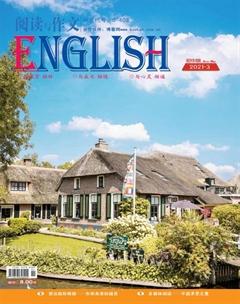硬币的另一面
I was doing a big clean-up recently and my kids were helping. As he rummaged through boxes and bags, one of my sons came across a knotted handkerchief with an old dark brown coin nestled inside.“Mum, can I have this? Can I play with this in my cash register?” he asked. I took one look and was immediately transported to another time. “You can play with all your coins, but not this one,” I said slowly.“This ones special. I will never again see the woman who gave this to me.” I fingered the coin gently. “This coin is worth much more than its monetary value.”
My son looked at me strangely and I explained. In 1991, I had spent five months in a bleak African country, Niger, ravaged by sandstorms and blistering heat. There were many things I found difficult about this place—the climate and beggars were my biggest and most constant gripes. Street urchins would continually thrust their hands into your face, shouting “Cadeau! Cadeau!” (gift) in French, the former colonial tongue. After Id finished my nursing stint there, a friend and I headed for neighbouring Burkina Faso to work at a health clinic. “Its much greener in Burkina. Even the Coke tastes better,” the locals assured us.
Arriving by taxi at our destination in Burkina, we began to unload. I had a large backpack and a smaller daypack. With my daypack wedged between my legs, I reached for my larger piece of luggage when, out of the darkness, a motorbike with two men approached slowly. Without warning, one of the men grabbed my daypack as the motorbike swept close by. Within seconds, the pair were out of sight, swallowed up by the night.
The bag had my passport, money, traveller cheques, camera, an airline ticket and other paraphernalia quite precious to me. I was in deep trouble. And the nearest Australian consulate was in Ethiopia. In the weeks that followed, I zealously guarded the rest of my valuables and regarded all locals with suspicion. I endured interrogations by the local authorities with thinly veiled frustration. All I wanted was to leave this hellhole. Then, walking through Burkinas streets one day, I was accosted by a wiry old woman who thrust her hand in my face. “Cadeau! Cadeau!” she cried. Id had enough. I was sick and tired of the country: its poverty and corruption, its thieves, its inefficiency, the heat, the dust and its time-wasting officials. I told her firmly in French, “I have no ‘cadeau. I have no money. A thief stole all my money two weeks ago and now I cant get out of your country. I cannot give you anything.”The beggar woman listened attentively and pondered my words. Then her face crumpled into a toothless grin as she reached into the folds of her dress.
“Then I will give you a cadeau,” she announced. Kindly, she placed an old, dark brown coin in my palm. I looked at it in shock. It was a minuscule amount of money—but for this woman, the coin represented a meal. In that moment, I felt the shame of affluence and the humility of charity. She had given me a gift disproportionate to anything that I had ever donated. In the midst of her poverty, she was able to give me something priceless. I saw then the unexpected beauty of the people of Burkina Faso—and appreciated profoundly the quiet dignity of the poor. Humbled by the womans unconditional gift, I hope never to part with the coin she gave me. With one small token, she turned my perceptions upside down.
最近,我在做家庭大扫除,我的孩子们在帮忙。我其中一个儿子翻箱倒柜时,发现了一条打着结的手帕,里面装着一个深棕色的旧硬币。“妈妈,这个可以给我吗?我可以用这个玩收银机吗?”他问道。我看了一眼,心神旋即飘到另一个时空。“你可以玩你所有的硬币,但这个不行,”我慢慢地说道。“这枚硬币很特别。我不会再看到那个送我硬币的女人。” 我轻触这枚硬币。“这硬币的价值远远超过它的面值。”
我儿子奇怪地看着我,我向他解释这是怎么一回事。1991年,我在尼日尔度过了五个月,尼日尔是个荒凉的非洲国家,饱受沙尘暴与酷热的侵袭。这个地方的很多东西我都感觉难以适应——气候和乞丐是最让我感到困扰的。街上的小孩会不停地把手伸到你的脸上,喊着“卡豆!卡豆!”“卡豆”在法语里是 “礼物”的意思,法语是尼日尔前殖民者的语言。我完成了在尼日尔的护理工作后,便和一个朋友前往附近的布基纳法索的一个保健所工作。“布基纳的绿化要好多了,就连这里的可乐都更好喝,”当地人向我们保证。
出租车把我们载到布基纳的目的地后,我们开始搬卸行李。我有一个大背包和一个小背包。我把小背包夹在双腿中间,伸手搬我的大件行李箱,这时,在黑暗中,两个男人骑着一台摩托车向我慢慢驶进。没有任何预警地,当摩托车从我身边疾驶而过时,其中一个男人抢走了我的小背包。一眨眼,那两个男人便离开了我的视线,消失在夜色当中。
我的护照、钱、旅行支票、照相机、机票和其他一些对我来说很重要的随身物品都放在那个包里面。我的麻烦大了。离这里最近的澳大利亚领事馆在埃塞俄比亚。在接下来的几周里,我神经兮兮地看管着余下的贵重物品,猜疑着所有的当地人。我一脸沮丧地忍耐着当地政府人員的盘问。我只想离开这个鬼地方。然后有一天,当我走在布基纳的街上时,一个身材瘦小的女人向我搭话,她把手伸到我的脸上。“卡豆!卡豆!”她大喊道。我受够了。我对这个国家厌倦到了极点:厌倦它的贫穷、腐败、小偷、低效率、炙热的天气、尘土以及浪费时间的官员。我用法语坚定地跟她说,“我没有‘卡豆。我没有钱。两周前,一个小贼偷走了我所有的钱,我现在没办法离开你的国家,我没有什么可给你的。”那个女乞丐专心地听着,思索着我的话。然后她把手伸进裙子的口袋里,皱巴巴的脸上堆出一个不见牙齿的笑容。
“那么我给你‘卡豆”她说道。她友好地把一个深棕色的旧硬币放进我的掌心里。我震惊地看着这个硬币。这只是很少的一点钱——但对这个女人来说,这个硬币代表着一顿饭。在那一刻,我感到了富裕的羞耻以及慈善的渺小。她给了我一份比我捐过的所有东西都更珍贵的礼物。尽管她很贫穷,但她给了我一件无价之宝。我从中看到了布基纳法索人民意料之外的美,并对穷苦人家抱有的淡定从容的心态生出一种深深的敬意。那个女人给我的这份无条件的礼物让我感到羞愧,我希望永远保留着这个硬币。她用一个小小的硬币改变了我对事物的看法。

